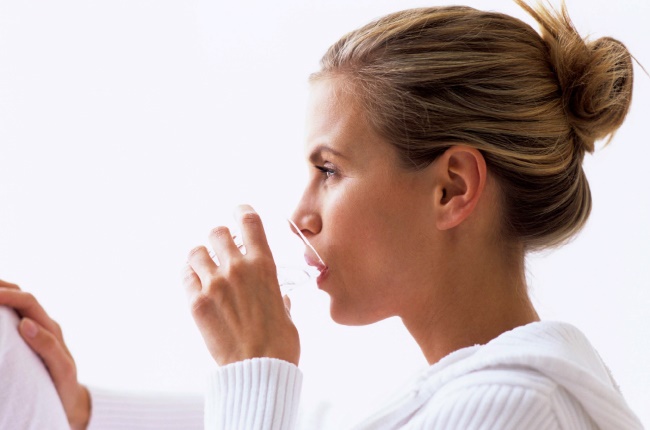
Understanding the symptoms of dehydration can help prevent more serious consequences – we help to break it down
When you or a family member are dehydrated, it’s not easy to feel or understand. When you’re hungry, cold or tired your first instinct will be to grab a snack, dress warmly or take a nap. When we’re thirsty, we’ll drink some water or whatever drink is closest, but more often than not, we don’t drink enough water – a seemingly small task, but if your body isn’t getting enough fluids, it could lead to dehydration.
Dehydration is a serious health concern and it might not be as easy to pinpoint as thirst, so here’s what to look out for and how to treat it.
What is dehydration?
Our bodies need water to function and up to 60% of the body’s weight is made up of water.1 This is why we need to keep the water levels constant to keep the body healthy and in tiptop shape. We get our water content from what we drink and eat.
Dehydration occurs when the amount of water leaving the body is greater than the amount being taken in.1 So, whether you’re a super mom on the go or an active child, it’s important to replace the fluid lost. Anyone can become dehydrated, but the condition is especially dangerous for young children and older adults.2
We lose water when we breathe and humidified air leaves the body (like on a cold day when you can see your breath in the air – this is water being exhaled) as well as when we sweat, urinate or have a bowel movement.1
What causes dehydration?
Common causes of dehydration include: diarrhoea, vomiting, sweat, diabetes (elevated blood-sugar levels cause sugar to spill into the urine, which makes you want to urinate), burns (damaged skin can’t prevent fluid from seeping out of the body) – as well as the inability to drink water when feeling nauseous or ill.1
The most common cause of dehydration in young children is severe diarrhoea and vomiting. Older adults naturally have a lower volume of water in their bodies and might have pre-existing conditions or take medications that increase the risk of dehydration.2
What to look out for:
- In infants or young children:
- Dry mouth and tongue2
- No tears when crying2
- No wet nappies for three hours2
- Sunken eyes and cheeks2
- Sunken soft spot on top of skull2
- Listlessness or irritability2
In adults:
- Extreme thirst2
- Less frequent urination2
- Dark-coloured urine2
- Fatigue2
- Dizziness2
- Confusion2
So how much water do we need to drink?
We’ve often been told we need to drink eight glasses of water a day and this is a good guide, but the amount of water we need actually depends on many factors – such as weight, age, the amount of fluids lost and how active we are. The US National Academies of Sciences, Engineering and Medicine recommend men consume 15,5 cups (3,7 litres) of fluids and women consume 11,5 cups (2,7 litres) of fluids a day, according to the Mayo Clinic.3
There are a few basic ways to tell if you’re mildly dehydrated. Your fluid intake is probably adequate if:
- You rarely feel thirsty.3
- Your urine is colourless or light yellow.3
That being said, a doctor or registered dietician can help you determine the amount of water you need every day.3
What’s the step-by-step treatment for someone who’s dehydrated?
1. Move the patient to a cool area. This will prevent them from losing moisture through sweating.
2. Keep the patient still – let them sit or lie down. This will stop them exerting themselves or fainting.
3. Give the patient small amounts of water.
4. A rehydration supplement such as Nudrate is the ideal way to replace fluids. It consists of oral rehydration salts and the much-needed electrolytes your body needs. Ensure you have the easy-to-use sachets at home so your family is covered when in need.
Click here to buy Nudrate and choose your preferred flavour.
Visit nudrate.co.za for more information.
For full prescription information refer to the packaging insert.
*Note: The health references were supplied by an external client. Oral Rehydration Salts Therapy is effective to assist with the treatment of the early stages of dehydration. Consult a medical professional when treating the symptoms of dehydration – especially in infants and the frail.
References: 1. Wedro, B.Dehydration Symptoms, Signs, Headaches & Other Effects. [Online]. From MedicineNet: https://www.medicinenet.com/dehydration/article [Accessed 28 July 2020]. 2. Mayo Clinic Staff. Dehydration Symptoms and Causes. From Mayo Clinic: https://www.mayoclinic.org/diseases-conditions/dehydration/symptoms-causes/syc-20354086?p=1 [Accessed 28 July 2020]. 3. Healthy Lifestyle – Nutrition and healthy eating. [Online]. From MayoClinic: https://www.mayoclinic.org/healthy-lifestyle/nutrition-and-healthy-eating/in-depth/water/art-20044256?pg=2) [Accessed 28 July 2020]
S0 Nudrate®. Each 5,3g sachet contains: Sodium citrate 0,73g, potassium chloride 0,38g, sodium chloride 0,65g, dextrose 3,38g. For full prescription information refer to the package insert. Further information is available on request from the applicant. Complementary Medicine. This unregistered medicine has not been evaluated by SAHPRA for its quality, safety or intended use. Applicant: Costiway (Pty) Ltd. Marketed by: Ranbaxy (SA)(Pty)Ltd. Ground Floor, Tugela House, Riverside Office Park, 1303 Heuwel Avenue, Centurion, 0046. Tel: +27 (0)12 643 2000. Website: www.sunpharma.com




 Publications
Publications
 Partners
Partners
















